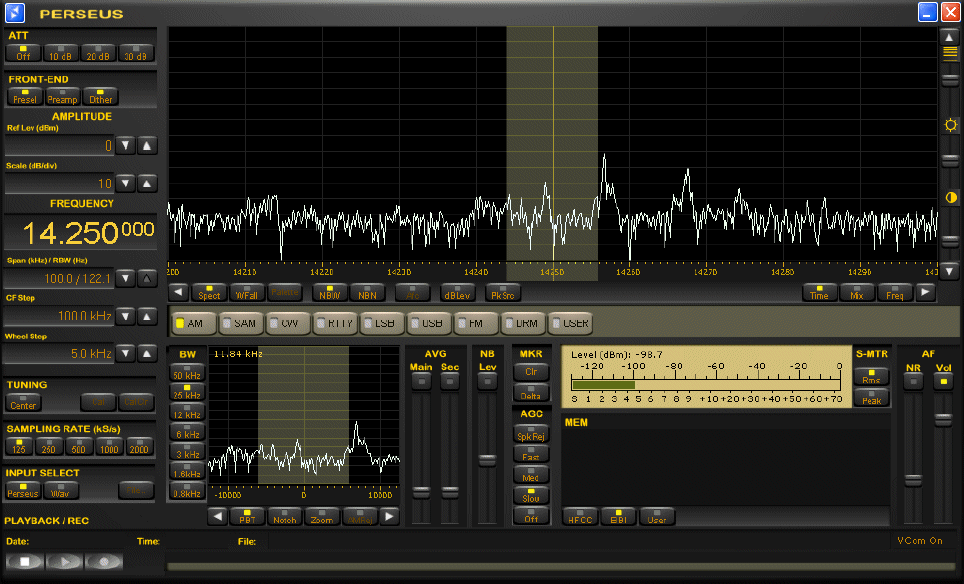Perseus

PC controlled direct sampling SDR receiver. Frequency range 0.01-30 MHz, supports wideband spectrum record/playback up to 1600 KHz bandwidth. Ideated in Italy, year of introduction 2007.
Reference market : amateur-radio
Perseus specifications
| General |
| Frequency coverage | |
|---|---|
| 0.0100 ~ 30.0000 MHz | |
| Mode [1] | |
| CW / LSB / USB / RTTY / AM / AM-S / FM | |
| Tuning step | |
| 1 Hz min 100 Hz / 1 / 2 / 5 / 9 / 10 / 20 / 25 / 50 / 100 / 200 / 400 / 500 KHz / 1 MHz |
| Receiver |
| Sensitivity | |
|---|---|
| CW | 0.25 uV (10dB S/N) |
| SSB | 0.5 uV (10dB S/N) |
| Selectivity | |
| 0.0x ~ 50 KHz user-defined | |
| IF filter ultimate attenuation | |
| > 100 dB | |
| ADC (Analog to Digital Conversion) | |
| Sample rate | 80 Msps |
| Resolution | 14 Bit |
| DDC bandwidth | 125 / 250 / 500 / 1000 / 2000 Ksps |
| RF attenuator | |
| 10 / 20 / 30 dB | |
| DR (Dynamic Range) | |
| 102 dB (2 KHz spaced signals, 7 MHz) 100 dB (2 KHz spaced signals, 14 MHz) |
|
| Blocking | |
| 124 dB (CW, dither OFF) 117 dB (SSB, dither OFF) |
|
| IP3 (3rd order intercept point) | |
| +31 dB | |
| Image rejection | |
| > 90 dB | |
| AGC (Automatic Gain Control) | |
| Fast, medium , slow, OFF | |
| Features |
| Memory | |
|---|---|
| Unlimited memory channels | |
| Antenna | |
| BNC 50Ω | |
| Power supply | |
| 5 VDC external 100~240 VAC with power adapter |
|
| Power consumption | |
| 700 mA | |
| Connections | |
| USB2.0 |
| Mechanical and environmental data |
| Operating temperature | |
|---|---|
| from 0°C to +40°C | |
| Dimensions | |
| 185 (W) x 36 (H) x 110 (D) mm | |
| Weight | |
| 380g |
- Further modes and variants such as DRM can be implemented by software.
The Perseus receiver is an SDR with a direct sampling architecture and the ability to store up to 1.6 MHz of the RF spectrum on a PC. The effective dynamics exceeds 100 dB in SSB and CW also for signals of minimum spacing, an excellent value that few devices reach. At the center of the electronics are a 14-bit analog-to-digital converter operating at a speed of 80 Msps and a subsequent high-performance FPGA (Field Programmable Gate Array) digital downconverter. The primary aspect in this receiver is the analogue front-end sized to satisfy even the most demanding operators including 10 dB steps attenuators, a high dynamic preamplifier with an IP3 of +31 dBm, a bank of 10 filters for signal preselection. The following table shows the frequency ranges of the aforementioned automatically selected filters according to the tuned frequency:
| Filter / Segment | |
|---|---|
| F.1 | 0~1.7 MHz |
| F.2 | 1.7~2.1 MHz |
| F.3 | 2.1~3.0 MHz |
| F.4 | 3.0~4.2 MHz |
| F.5 | 4.2~6.0 MHz |
| F.6 | 6.0~8.4 MHz |
| F.7 | 8.4~12.0 MHz |
| F.8 | 12.0~17.0 MHz |
| F.9 | 17.0~24.0 MHz |
| F.10 | 24.0~32.0 MHz |
As observed, the bandwidth is significantly less than one octave in favor of IP2 (second order intercept) and distinguishing itself from many other receivers that use fewer filters. The operator can also switch-off the preselector by directly connecting the antenna input to the next stages, in this mode Perseus is used as a broadband spectrum analyzer from 10 KHz to 40 MHz with over 100 dB of dynamics and a resolution of 10 kHz . The software, for 32 and 64-bit Windows operating systems, is up to hardware performance with all the traditional commands of an HF receiver plus the specific ones organized in the main interface. The CAT protocol on virtual serial port and the virtual audio channel (VAC) output also allow the addition of third-party software.

Default interface of the Perseus software
The S-meter indicator shows the intensity both in standard S points and in dBm units with a linear function on the entire scale, the accuracy reaching less than 1 dB allows the use of Persus as an RF measuring instrument. Among the external accessories we mention Tmate, a mini console with a solid aluminum knob and 4 programmable function keys. With this through the dedicated software we perform the main tuning operations in the typical modes of a conventional radio.
Perseus performance and practical notes :
The Perseus receiver is, under different points of view, an original project conceived having very clear the real needs of the fans. Factors such as the almost constant sensitivity over the entire frequency range, an excellent dynamic even for near signals, the recording of an entire band segment, are aspects that are not recognized in products of brands rooted in the sector for much longer. An advantage in terms of performance combined with flexibility in the mode of use is virtually limited by the operator's imagination alone. For example, AM-DX enthusiasts can memorize substantially the entire range of medium waves during an external monitoring session, where the reduced noise allows unparalleled receptions, then reproduce all the signals at a later time, choosing to listen to any output in any mode combination (SSB, AM, synchronous AM), bandwidth, etc.
Perseus price
We have collected for your convenience the Microtelecom PERSEUS sale price (US Dollar) and its trend over time. Useful to guarantee a cheaper purchase of this radio and to put it for sale in the second-hand market. Of course offers, accessories, warranty terms and conditions can lead to different figures.
|
|
|
|
|
USD 968.00 (825EUR) |
2021-oct | Brand-new |
|
USD 936.00 (799EUR) |
2018-nov | Brand-new |
|
USD 537.00 (400GBP) |
2018-nov | Second Hand |
Perseus review
| Sensitivity | |
| Selectivity | |
| Dynamic range | |
| Spurious response | |
| Audio | |
| Signal functions | |
| Control functions | |
| User friendly | |
| Stars: 1=insufficient | 2=just sufficient | 3=mediocre | 4=good | 5=excellent | |
Your opinion on merits, defects, experiences, with this radio set is welcome. Write your review, after a technical evaluation by our staff if found suitable will be published on this page. We thank you for your precious contribution.













